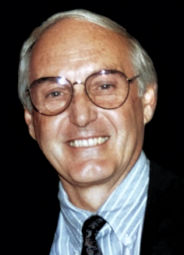Elliot Danforth, Jr. was born in 1933 in Bainbridge, NY. His father was a locally, well-known family physician and his mother, Ellen, was his nurse. He graduated from Sidney Central School in 1952 and completed premedical studies at Dartmouth College in 1956. He earned his Master's Degree in biochemistry at Ohio State University, and his M.D. degree at Albany Medical College in 1962. His internship and residency in internal medicine were at Dartmouth Medical School. Dr. Danforth served his country as a Captain in the US Army Medical Corp (USAMC) in Vietnam and then at Walter Reed Army Institute of Research, where he worked in endocrinology and metabolism until joining University of Vermont College of Medicine in 1970.
Now Emeritus Professor of Medicine at the University of Vermont College of Medicine, Dr. Danforth served that college as Chief of the Division of Endocrinology, Metabolism and Nutrition; Director of the General Clinical Research Center; and Principal Investigator of the Simms Obesity/Nutrition Research Center between 1970-1993. Following his academic career, Elliot became Executive Director of the Cardiovascular & Metabolic Research Division of Lederie Laboratories and, in 1998, President and CEO of Beartown Pharma, Inc., a small biopharmaceutical company in Vermont. He is internationally recognized for work in metabolic diseases and is the author of more than 200 scientific papers, textbook chapters and other publications.
He was active in the Vermont Studies of Obesity and pivotal clinical studies of diabetes and obesity in the Pima Indians at the National Institute of Health Clinical Research Center in Phoenix, Arizona. He served as a Fogarty International Scholar and Invited Professor of Medicine at the Universities of Geneva and Lausanne, Switzerland. He has served as an editor for several medical journals and, at 81 years old, occasionally acts as a consultant to the NIH and the pharmaceutical industry. Elliot's unique study in association with Ethan Simms, M.D., known widely as "The Vermont Studies of Obesity'' is considered a classic and is still cited today in related work along with what is commonly referred to in endocrine/metabolic circles as "the Danforth Hypothesis:" "If you cannot create new fat cells in the presence of overfeeding, you will put this new fat in tissues that are not designed to support it, such as in liver, muscle, and/or pancreas." This "ectopic fat deposition" can be the cause of a variety of diseases and disabilities, including diabetes.
Elliot's early patient care as an endocrinologist; his training of medical residents, Ph.D. candidates and several highly recognized academic scientists; his consulting work for the NIH and major pharmaceutical companies; and his military service have led to major contributions to scientific discovery and patient care.

